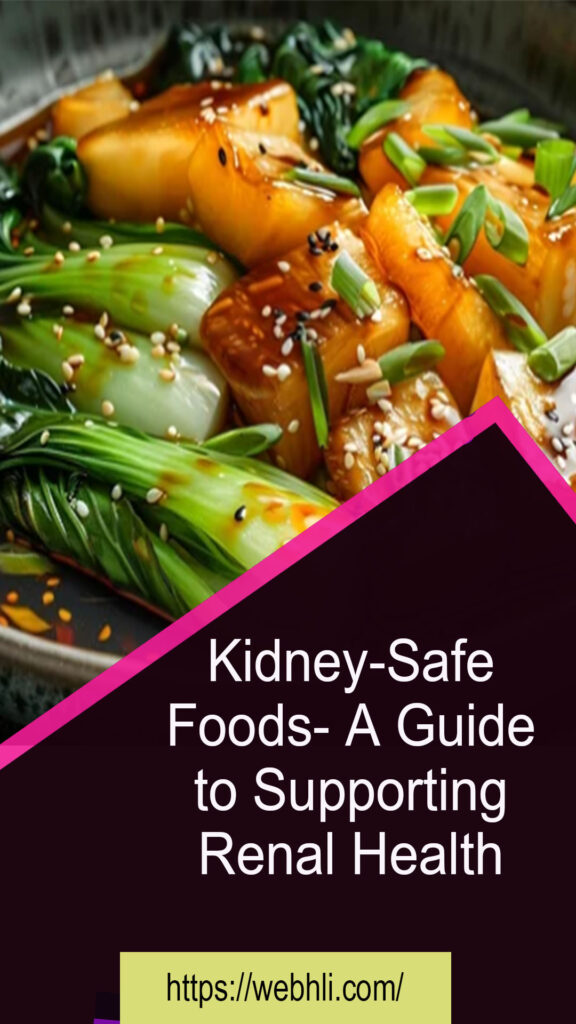
Maintaining kidney health is crucial for overall well-being, as these vital organs filter waste and excess fluids from the blood, regulate electrolytes, and support other essential functions. A kidney-friendly diet can help prevent kidney disease or manage existing conditions. Here’s a comprehensive guide to kidney-safe foods that support renal health.
Understanding Kidney Health
The kidneys play a critical role in filtering blood, removing waste products, and balancing fluids and electrolytes in the body. When they are not functioning properly, waste can build up, leading to various health issues. A kidney-friendly diet focuses on minimizing the intake of substances that the kidneys have to work hard to filter, such as sodium, potassium, phosphorus, and certain proteins.
Check out these related articles, too:
What You Should Look Out For For Kidney Failure Symptoms?
Kidney Failure Treatment Without Dialysis
Kidney Diet Secrets That Can Reverse Chronic Kidney Failure
The Effects of High Potassium For Kidney
What Is A Healthy Kidney Diet Plan
Diet Tips For People With Diabetes and Kidney Disease
Are Renal Insufficiency And Kidney Failure The Same Thing
5 Natural Supplements For Chronic Kidney Disease
Bitter Melon Recipe For Diabetes
Key Principles of a Kidney-Safe Diet
- Limit Sodium: High sodium intake can increase blood pressure and cause fluid retention, putting extra strain on the kidneys.
- Manage Potassium and Phosphorus: Excessive potassium and phosphorus can be harmful if the kidneys cannot effectively filter them.
- Control Protein Intake: While protein is essential, too much can burden the kidneys, especially in advanced kidney disease.
Top Kidney-Safe Foods
1. Red Bell Peppers
- Benefits: Low in potassium and rich in vitamins A, C, and B6, folic acid, and fiber.
- How to Enjoy: Add raw to salads, stir-fry, or stuff with quinoa and vegetables.
2. Cabbage
- Benefits: Low in potassium and sodium, high in fiber, vitamins K and C, and phytochemicals that combat oxidative stress.
- How to Enjoy: Use in salads, coleslaw, or stir-fry with other kidney-safe vegetables.
3. Cauliflower
- Benefits: Low in potassium, high in fiber and vitamin C, with anti-inflammatory compounds.
- How to Enjoy: Steam, mash as a potato substitute, or roast with herbs.
4. Blueberries
- Benefits: Packed with antioxidants, low in sodium, potassium, and phosphorus, and high in fiber.
- How to Enjoy: Eat fresh, add to oatmeal, or blend into smoothies.
5. Apples
- Benefits: Low in potassium, rich in fiber and anti-inflammatory compounds, and help regulate blood sugar.
- How to Enjoy: Eat raw, add to salads, or bake with cinnamon for a healthy dessert.
6. Garlic
- Benefits: Adds flavor without sodium, contains antioxidants and anti-inflammatory properties.
- How to Enjoy: Use fresh, minced in cooking, or roasted as a spread.
7. Onions
- Benefits: Low in potassium, adds flavor without sodium, and contains flavonoids for heart health.
- How to Enjoy: Sauté, caramelize, or use raw in salads and sandwiches.
8. Cranberries
- Benefits: Support urinary tract health, low in potassium, and have anti-inflammatory properties.
- How to Enjoy: Add dried cranberries to salads or oatmeal, or drink unsweetened cranberry juice.
9. Egg Whites
- Benefits: High-quality protein with low phosphorus content.
- How to Enjoy: Use in omelets, scrambles, or as a protein addition to salads.
10. Olive Oil
- Benefits: Healthy fat with anti-inflammatory properties, and helps absorb fat-soluble vitamins.
- How to Enjoy: Use in dressings, for sautéing, or drizzling over vegetables.
Foods to Limit for Kidney Health
1. High-Potassium Foods: Bananas, oranges, potatoes, tomatoes, and spinach should be limited or avoided. 2. High-Phosphorus Foods: Dairy products, nuts, seeds, beans, and processed meats can be problematic. 3. High-Sodium Foods: Avoid processed foods, fast food, and salty snacks.
Tips for a Kidney-Friendly Diet
- Cook at Home: Preparing your meals allows you to control ingredients and portion sizes.
- Stay Hydrated: Drink plenty of water to help the kidneys function properly, but consult with a healthcare provider for specific fluid intake recommendations.
- Read Labels: Check food labels for sodium, potassium, and phosphorus content.
- Work with a Dietitian: A registered dietitian can help create a personalized eating plan that meets your nutritional needs while protecting your kidneys.
Check out these related articles, too:
Are you suffering from hypoglycemia
How does insulin affect your life
Diabetics Should Not Have A High Carb Diet Due To Blood Pressure
Kidney Disease (Nephropathy) of Diabetes
Conclusion
Incorporating kidney-safe foods into your diet can play a significant role in maintaining and improving kidney health. By focusing on low-sodium, low-potassium, and low-phosphorus foods, and managing protein intake, you can support your kidneys and overall health. Always consult with a healthcare professional before making significant changes to your diet, especially if you have existing kidney conditions. By making mindful food choices, you can enjoy a delicious and nutritious diet that supports renal health and enhances your quality of life.

 Protected by Patchstack
Protected by Patchstack